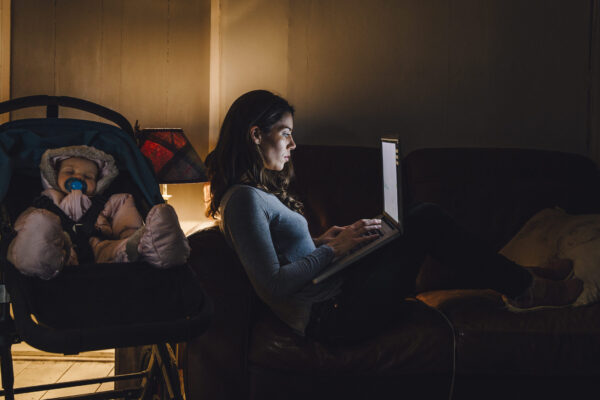“We expect parents to work like they don’t have children and raise children as if they don’t work.”
For me, this statement certainly strikes a chord. It takes me back to my early freelance days when I used to cover up the fact that I had a young family.
If I was looking after my boys, I’d often tell my clients that I was in a meeting. When it came to the school holidays, I’d pretend I was away in a foreign country when, actually, I was at home looking after the kids.
Why did I do it? Because I was worried about my professional image. I’d just left my steady 9-to-5 to be a writer and was concerned I wouldn’t get enough work to make ends meet. I thought, in the eyes of my clients, childcare was an excuse not to work when, actually, it’s a very valid reason.
Of course, I was completely wrong, but I wasn’t the only worker brushing over my role as a parent. “Many women who had gone back to work tried to conceal that they had small children or pretended that their children’s interests were of little importance to them,” according to a report into working mothers.

Hiding our children
Other parents seem to take similar measures, effectively hiding their children because they do not want others to think they are anything but 100 per cent committed to their job.
As time went by and more work came in, I had a new problem. I was saying ‘yes’ to work even though I knew my diary was full up with other commitments. Although this isn’t a direct consequence of glossing over my family responsibilities, it certainly impacted them.
I’d work throughout the six-hour school day, pick up the boys, put them to bed, and then work from 7 pm until 1 am. Then, I’d get up at 6 am to squeeze in another hour before the children got up. It was an unhealthy cycle, where I wouldn’t turn any contract down for fear of losing a client. In my head, downtime was wasted time.
But my drive to make my business succeed was blindsiding me to the fact that I was failing to achieve that hallowed work-life balance of freelancing. I edged ever closer to burnout as the lines between my home and work lives disappeared.
Change your mindset
When I found myself pulling all-nighters during a family holiday, I realised this wasn’t why I wanted to freelance in the first place.
So, I changed my mindset. Now, if I do the school run and can’t make a meeting, I don’t make up an excuse. I have to pick up the kids. Deal with it. My laptop stays at home when we go on holiday now too.
The stupid thing is, when I made this change, most of my clients didn’t bat an eyelid. When I look back on those early days and wonder why I disguised my family, I realise it comes down to two things. First, my inexperience as a freelancer and the imposter syndrome that crippled me. I felt I had to say ‘yes’ to everything because I had zero confidence in my own abilities and did not have the safety net of permanent employment to fall back on.
Second, the false assumption that being a parent means you’re not committed to your job. It’s certainly an issue that affects both employees and the self-employed – 50 per cent of workers feel judged by bosses and co-workers when they try to balance their work and family commitments, and 75 per cent suffer from stress and anxiety as a result of their work-life balance.
Freelancers may even struggle more than employees as further research reveals “that experiences of work-family conflict differ between self‐employed and employees. Self‐employed men and women, especially those with employees, generally experience more work-family conflict than do employees.”
Self‐employed men and women, especially those with employees, generally experience more work-family conflict than employees
The self-employment sector is falling far behind employment
We don’t get shared parental leave. We don’t get statutory maternity or paternity pay.
Despite the number of self-employed mums doubling since 2008, it still feels like freelancers face all the pressures of working parents – but with none of the support and security that employees get. That’s why we have to stand up for the rights of self-employed parents, which is one of the pillars of the IPSE manifesto.
I was completely wrong to ever hide the fact I had children. By sweeping my parental duties under the carpet, I was adding to this toxic culture. We need to normalise parenting for freelancers, allowing parents to work like they do have children and raise children as if they do work.






